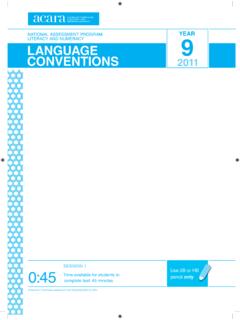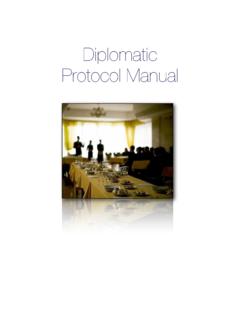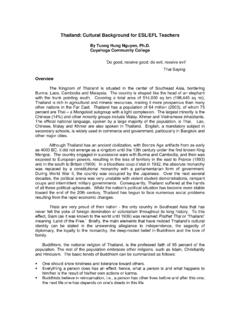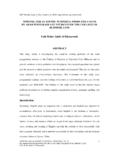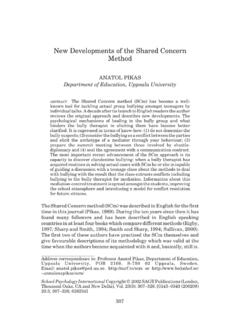Transcription of BASIC D20 - easydamus.com
1 1 BASIC D20 BASIC d20 is a simplified version of the d20 system suitable for use in any d20-based campaign. This system has been designed for quick character generation and ease of play. The focus is to make it simpler for players. The GM, however, must be well-versed in the d20 system to make use of this set of rules. Of course, all d20 resources can be used with this set of rules, without conversion. ABILITY SCORE MODIFIERS BASIC d20 uses the ability score modifiers for the six ability scores (normally ranging from -4 to +4). This makes it easier on the players to figure out what to add to a d20 roll (as in, Everyone roll a d20 and add your Dexterity to see who goes first. ). ABILITY SCORE DESCRIPTIONS The table below is used to randomly generate each of the character s ability score modifiers.
2 Apply any racial bonuses and penalties to this roll (not the ability score modifier). Also, a descriptor for each score along with its meaning is given so that you can explain what these scores mean to your players in plain terms (such as, You have a +2 Intelligence, this means your character is significantly above average. ). Roll (3d6) Ability Score Modifier Descriptor Meaning 1 or less -5 Abysmal Severely Handicapped 2-3 -4 Awful Severely Impaired 4-5 -3 Bad Impaired 6-7 -2 Poor Significantly Below Average 8-9 -1 Mediocre Below Average 10-11 +0 Fair Average or Normal 12-13 +1 Good Above Average 14-15 +2 Great Significantly Above Average 16-17 +3 Exceptional Gifted 18-19 +4 Amazing Highly Gifted 20 or more +5 Phenomenal Exceptionally Gifted Do not use more favorable methods of rolling on this table.
3 BROAD SKILLS BASIC d20 uses a broad skill system that groups traditional d20 skills into twelve broad skill areas. Furthermore, it adds four broad skills that define offensive and defensive combat ability (Fight, Shoot, Dodge, and Parry). Finally, the three save bonuses and hit dice are made into four additional broad skills (Fortitude, Reflex, Toughness, and Will). This totals 20 broad skills. The full BASIC d20 skill list is below. Not all campaigns will use all skills or use them the same way. For example, in a mainstream D&D-like campaign, Dodge and Parry will not be used, since these skills 2 provide a Defense Bonus. Also, GMs can change the d20 Skill Equivalents area as needed. Perhaps you d like to put Appraise into the Awareness category?
4 Any traditional d20 skill is now referred to as a specialty. For example, Bluff is a specialty under the Interaction broad skill. Any feats or other types of bonuses that apply to normal d20 skills must be applied to the appropriate specialty. So, if a character gets Skill Focus (bluff), this applies only to Interaction skill rolls involving the Bluff specialty. For simplicity, the GM can avoid using specialties altogether, if desired. Note that a normal d20 skill can be part of more than one skill area (Ride is part of Athletics and Wilderness, for example). Broad Skills Default Ability d20 Skill Equivalents (Specialty Skills) D&D 3 , Pathfinder, Modern, CoC, Star Wars, Gamma World and M&M Athletics Dex Acrobatics, Balance, Climb, Fly, Jump, Ride, Swim, Tumble Awareness Wis Concentration, Investigate, Listen, Notice, Perception, Search, Sense Motive, Spot Dodge Dex Ranged Defense (unless denied the Dex bonus to AC) Fight Str Base Attack Bonus for Melee Attacks, Fighter Level for feats Fortitude Con Fortitude Save Interaction Cha Bluff, Diplomacy, Innuendo, Gamble, Gather Information, Knowledge (gossip), Intimidate, Read Lips Knowledge Int Appraise, Knowledge (all subskills not mentioned elsewhere)
5 , Research Languages Int Decipher Script, Linguistics, Read/Write Language, Speak Language, Speak Other Language Parry Dex Melee Defense (unless denied the Dex bonus to AC) Performance Cha Craft (artistic, visual art, writing), Disguise, Entertain, Perform Profession Wis Profession (all subskills), Reputation (Ranks/4) Reflex Dex Reflex Save Science Int Alchemy, Craft (alchemy), Craft (pharmaceutical), Heal, Knowledge (architecture and engineering, behavioral sciences, earth and life sciences, physical sciences), Medicine, Psicraft, Psychoanalysis, Spellcraft, Treat Injury Shoot Dex Base Attack Bonus for Ranged Attacks, Fighter Level for feats Technology Int Computer Use, Computers, Craft (all not mentioned elsewhere), Demolitions, Knowledge (technology), Repair, Scry, Use Magic Device, Use Psionic Device Thievery Dex Disable Device, Escape Artist, Forgery, Hide, Knowledge (streetwise), Move Silently, Open Lock, Pick Pocket, Sleight of Hand, Stealth Toughness Con Toughness Save or Hit Dice (1d6 per rank) or Hit Points or Vitality (4 per rank) Vehicles Dex Astrogate, Drive, Navigate, Operate Heavy Machinery, Pilot Wilderness Wis Animal Empathy, Handle Animal, Intuit Direction, Knowledge (dungeoneering, nature), Ride, Survival, Use Rope, Wilderness Lore Will Wis Will Save, Autohypnosis, Psychic Focus The Default Ability is simply an aid to the GM.
6 Obviously, not all d20 uses will call for the default ability. GMs can use any Ability + Skill add for a d20 check. For example, the GM could decide to call for an Int + Thievery roll if the character creates a forgery (instead of Dex + Thievery). 3 The Toughness skill is a special case, and its use varies according to the style of the campaign and the preference of the GM. Toughness ranks can be used to gain a bonus to the Toughness save, gain hit dice, hit points, or vitality points depending on the campaign. The Toughness feat is not used if the Toughness skill represents a save bonus (like in M&M). If the Toughness skill will behave as hit dice, then the default hit die is d6. If the Toughness skill is used to determine hit points or vitality points, then one rank gives four points to the character.
7 Characters may purchase up to two Toughness feats per rank of Toughness skill (but no more). Each Toughness feat gives the character three additional hit points or vitality points. Therefore, the maximum number of hit points or vitality points a character can gain is ten per Toughness rank (if two Toughness feats are purchased per rank). If a character has no ranks in Toughness, then he has a +0 Toughness save bonus, 1 hit point, or 0 vitality points. The Skill Focus feat (and equivalents) can still be used. Simply apply the feat to one particular specialty in the broad skill (like Use Rope for Wilderness). Most of the time, the Profession skill should be used this way. Also, you needn t have ranks in a skill to take Skill Focus.
8 You could have zero ranks in Knowledge and take a Skill Focus feat for Appraise (for example) to make a character who is better at judging the value of items, but doesn t really know much about academics. SKILL AND POWER DESCRIPTIONS Use the tables below to describe to the players what certain skill ranks and resistances mean in plain language. For example, you could tell a player that Your character is Tough and Nimble, but Unassertive, if his character has a Fort Save of +4, a Ref Save of +2, and a Will Save of -2. Most characters will start as Novices in their broad skills and powers, but as the campaign progresses they will become Experts and Masters. Descriptions bring the numbers alive and help the players imagine what their characters are like.
9 SKILL RANK AND POWER LEVEL DESCRIPTIONS Skill Ranks or Power Level Descriptor Meaning 0 Unskilled Has no training, just natural ability 1-2 Beginner A true beginner at the skill 3-4 Novice Some practice in the skill 5-6 Amateur A dabbler in the skill, apprentice-level 7-8 Competent Can complete most skill-related tasks 9-10 Proficient Can earn a living with this skill 11-12 Adept Produces good work and can teach this skill 13-14 Expert Can earn a very successful living with this skill 15-16 Accomplished Produces exceptional results with this skill 17-18 Master Invents new techniques in using this skill 19-20 World-Class One of the best in the world at this skill 4 RESISTANCE DESCRIPTIONS (OVERALL BONUS = ABILITY + RANKS) Overall Bonus Fortitude/Toughness Dodge/Reflex/Parry Will -5 Decrepit Unreactive No Will -4 Feeble Lethargic Spineless -3 Frail Sluggish Weak -2 Fragile Slow Unassertive -1 or +0 Delicate Hesitant Diffident +1 or +3 Sturdy Nimble Certain +4 or +6 Tough Fast Confident +7 or +9 Hardy Quick Determined +10 or +12 Rugged Rapid Controlled +13 or +15 Impervious Lightning Fast Iron-willed +16 or +18 Nigh Invulnerable Untouchable Unshakeable +19 or higher Invulnerable Perfect Reflexes Closed Mind ADVANTAGES (FEATS AND CLASS SPECIAL ABILITIES) Use whatever feats you want from D&D, Pathfinder, M&M, Modern, etc.
10 Don t forget these. Armor proficiencies must be purchased as well as the feats for weapons. Simple Weapons gives you all simple weapons, but Martial Weapon Proficiency only gives you one weapon. If you allow Archaic Weapons Proficiency (from M&M), then you get all archaic weapons for 1 PP. The Toughness feat is used as described above. The so-called skill feats add bonuses to specialties within each broad skill (not the whole area itself). Acrobatic, for example, gives a +2 to Jump and Tumble only. Skill Focus grants a +3 bonus on one specialty, such as Bluff. You can use Item Creation feats or Artificer (depending on whether you re more D&D or M&M in your campaign). Some feats will become less useful in some campaigns (like the Dodge feat in a campaign that features the Dodge skill).
